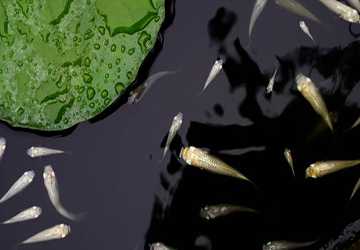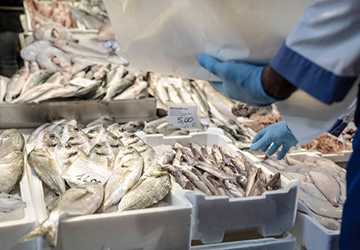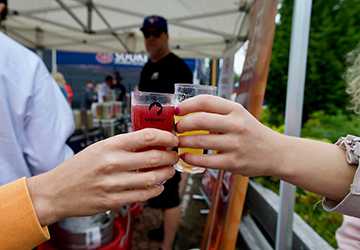deliciousfood
Pursuing sustainable seafood is increasingly recognized as a paramount endeavour, as gastronomes, culinary artisans, and food industry luminaries ardently seek more environmentally conscientious and judicious seafood consumption practices. This campaign is steadfast in its goal to ensure our marine ecosystems' vitality, fecundity, and long-term viability for successive generations. The sustainable seafood pioneers spearhead this vital initiative, championing and executing strategies aimed at curtailing overfishing, incidental catch, and the deleterious impacts associated with fishing modalities.

Explicating Sustainable Seafood
At its essence, sustainable seafood is predicated on procuring fish and molluscs in a manner that guarantees future populations can be sustained or augmented without harming the ecosystems from which they are harvested. This concept hinges on a harmonious balance between consumer demand and the ocean's sustainable yield.
The Vanguard of Sustainable Seafood Pioneers
Sustainable seafood pioneers stand at the forefront, advocating for and instituting practices that ensure the perpetuation of marine resources. Their endeavours span the spectrum of the seafood industry, from adopting ecologically benign fishing methods to the enlightenment of the populace regarding sustainable practices.
Key Figures Spearheading this Crucial Initiative
1. Non-Governmental Organizations (NGOs)
An abundance of benevolent organizations and advocacy coalitions spearheads the movement towards embracing environmentally prudent seafood procurement practices. Illustrious groups such as the Marine Stewardship Council (MSC), Monterey Bay Aquarium's Seafood Watch, and the World Wildlife Fund (WWF) persistently endeavour to advocate for reasonable fishing methods and disseminate knowledge concerning the paramount importance of selecting seafood sourced through sustainable means.
2. Seafood Industry Leaders
A select group of innovators within the aquatic commerce sphere has zealously undertaken initiatives to nurture sustainability across this domain. Distinguished entities like Thai Union, Bumble Bee Foods, and Pacific Seafood have committed to sourcing marine fare through ethically responsible channels, embracing ecologically sustainable practices, and endorsing endeavours to preserve aquatic habitats.
3. Governance and Oversight Entities
Governance and oversight entities occupy a critical role in the strategic oversight of fishery management and developing policies designed to secure the perpetual sustainability of marine culinary resources. Organizations such as the United States National Oceanic and Atmospheric Administration (NOAA) and the European Union's Directorate-General for Maritime Affairs and Fisheries remain resolute in enforcing regulatory measures, monitoring marine populations, and promulgating the adoption of ethical fishing practices.
4. Celebrity Chefs and Restaurants
Celebrated culinary virtuosos and esteemed gastronomic institutions have gradually coalesced around the principles of sustainable seafood, utilizing their stature to cultivate awareness and motivate consumers towards making environmentally considerate culinary selections. Esteemed gastronomes such as Rick Stein, Nobu Matsuhisa, and José Andrés have ardently endorsed sustainable seafood measures and woven sustainably harvested marine products into the fabric of their gastronomic creations.
5. Aquatic Agriculturists and Marine Product Merchants
Aquatic agriculturists and marine product merchants are fundamentally integral to the sustainable seafood initiative. They labour with a dedication to harvesting the ocean's bounty in an environmentally conscientious manner. Many traditional fishers and localized seafood purveyors prioritize eco-friendly extraction techniques, opting for approaches that curtail accidental bicatch, shield vulnerable marine ecosystems, and sustain the continual vitality of fish populations.

Innovation in Harvesting Techniques
A central concern for sustainable seafood pioneers involves refining and recommending fishing apparatus that minimizes bycatch, implementing quotas to forestall overfishing, and promoting aquaculture practices that are harmonious with local ecosystems and do not perturb them.
Pedagogical Ventures and Consciousness Raising
Imperative to their mission is the aim to elucidate the populace regarding responsible seafood choices, encompassing:
● The development of identification systems for sustainably sourced products.
● The orchestration of campaigns to elevate awareness regarding the ecological footprint engendered by seafood consumption.
The Imperative of Seafood Sustainability
The imperative for seafood sustainability is incontrovertible. As the global populace burgeons, so does the demand for seafood, presaging potential depletion of marine resources absent sustainable stewardship.
Ecological Ramifications
The consequences of unsustainable fishing practices portend grave ecological repercussions, including the obliteration of marine habitats, the attrition of fish populations, and the disruption of marine environmental balance.
Economic and Societal Implications
The neglect of seafood sustainability principles bears profound economic and social implications, manifesting as the erosion of livelihoods for communities reliant on fishing and escalating food insecurity in locales dependent on seafood as a staple protein source.
Advocating for Responsible Seafood Choices
The consumer’s role in propelling seafood sustainability is pivotal. Advocating for responsible seafood choices involves:
● Selecting seafood endorsed by reputable sustainability entities.
● Patronizing local fisheries committed to sustainable practices.
● Exhibiting discernment regarding the seafood species consumed and their sustainability status.
The Horizon for Sustainable Seafood
The trajectory of sustainable seafood is contingent upon a synergistic collaboration between sustainable seafood pioneers, connoisseurs, policy framers, and the seafood industry. This collaboration focuses on augmenting the traceability and transparency of seafood supply chains, fortifying regulations governing sustainable fishing practices, and advancing innovations in aquaculture.
Innovations in Aquaculture Practices
Pioneering Sustainable Aquaculture Techniques
Technological advancements in aquaculture offer solutions that harmonize with seafood sustainability objectives. Methods such as recirculating aquaculture systems (RAS) significantly lessen environmental footprints by recycling aquatic resources and diminishing pollutants. Furthermore, the propagation of seaweeds and shellfish, which necessitates no supplemental feeding and purifies water of surplus nutrients, is celebrated for its ecological sustainability.
The Vanguard Role of Biotechnology in Sustainability
Biotechnology stands at the forefront of the sustainable seafood crusade. Genomic research and breakthroughs are paving the way for species that are more resistant to diseases, and exhibit accelerated growth rates, thus diminishing the reliance on pharmaceuticals and chemicals. This scientific progress bolsters the ecological efficiency of aquaculture practices, rendering them more productive and less environmentally intrusive.
Empowering Consumers and Shifting Market Dynamics
Emergence of Environmentally Aware Consumers
A transformation in consumer behaviour is markedly influencing the seafood marketplace. Environmentally conscious consumers are clamouring for transparency and sustainability in their seafood selections, propelling the market toward more ethical practices. This movement motivates retailers to procure sustainably and empowers consumers to act as custodians of the seas.
Conclusion
The crusade for sustainable seafood is imperative for conserving our marine environments and the overall well-being of our planet. By championing sustainable seafood pioneers and electing responsible seafood choices, we contribute to fostering an aquatic ecosystem that is resilient, flourishing, and replete with biodiversity.





